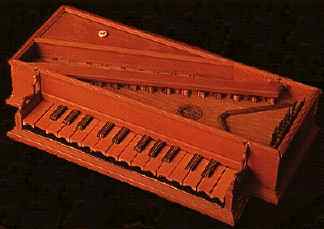Shakespeare and music
As the previous pages show, Shakespeare would have heard in the Court and in the houses of the educated the sophisticated madrigals and instrumental music of Thomas Morley; in Westminster Abbey or St. Paul's he would have heard the masses of William Byrd, and around the streets of London he would have heard ageless folk music: the street cries, the ballads*, the love songs.
On the stage, music played an important role. There was a special musicians' gallery above the stage; sometimes the music was played on the stage itself*; and there were even occasions when it was played under the stage to achieve an eerie effect. The comedies are full of song and the gentle twanging of the lute, while the tragedies and histories echo with the ceremonial sound of trumpets and drums.
Only a few of the original settings of songs Shakespeare wrote have survived; those that do illustrate the variety and melodic inventiveness of the music of the period.
Songs from the plays
From As You Like It, there is the lyric "It Was a Lover and His Lass"* (2.3.112-144), set by Thomas Morley; from The Tempest there are two pieces sung by Ariel: the haunting "Full Fathom Five"* (1.3.18-22) and Ariel's delighted response to the promise of freedom, "Where the Bee Sucks."*
The use Shakespeare makes of music in his plays is further discussed in the section of the program on staging.
Footnotes
-
A popular ballad
One ballad is about the rambunctious Bartholomew Fair: click to see (and hear) it.
-
Musical theater
Many of the songs would have been accompanied by the singer himself on lute; in Romeo and Juliet musicians also appear before the Capulets' home for the ill-fated wedding with Paris (4.5. 96-106); in Twelfth Night there is a lot of roistering and singing on stage, and so on.
-
"It was a lover and his lass"
It was a lover and his lass,
With a hey, and a ho, and a hey nonino,
That o'er the green cornfield did pass
In springtime, the only pretty ringtime,
When birds do sing, hey ding a ding, ding,
Sweet lovers love the spring.
Between the acres of the rye,
With a hey, and a ho, and a hey nonino,
These pretty country folks would lie
In springtime, etc.
This carol they began that hour,
With a hey, and a ho, and a hey nonino,
How that a life was but a flower
In springtime, etc.
And therefore take the present time,
With a hey, and a ho, and a hey nonino,
For love is crowned with the prime
In springtime, etc.The music is by Thomas Morley.
-
"Full fathom five"
Full fathom five thy father lies;
Of his bones are coral made;
Those are pearls that were his eyes;
Nothing of him that doth fade
But doth suffer a sea change
Into something rich and strange.
Sea mymphs hourly ring his knell;
Hark! Now I hear them--ding-dong-bell.
(The Tempest, 1.2.397-405)
The music is by Robert Johnson.
-
"Where the bee sucks"
Where the bee sucks, there suck I;
In a cowslip's bell I lie;
There I couch wnen owls do cry.
On the bat's back I do fly
After summer merrily.
Merrily, merrily shall I live now
Under the blossom that hangs on the bough.
(The Tempest, 5.1.88-94)
The music is by Robert Johnson.
